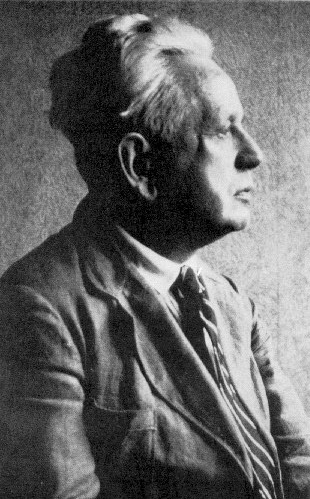- Ernst Cassirer
Infobox_Philosopher
region = Western Philosophy
era =20th-century philosophy
color = #B0C4DE
image_caption = Ernst Cassirername = Ernst Cassirer
birth =July 28 ,1874 (Breslau,Germany )
death =April 13 ,1945
school_tradition = PhenomenologyErnst Cassirer (
July 28 ,1874 –April 13 ,1945 ) was a GermanJew ishphilosopher . Coming out of the Marburg tradition ofneo-Kantianism , he developed aphilosophy of culture as a theory of symbols founded in a phenomenology of knowledge. His son,Heinz Cassirer , was also a Kantian scholar.Biography
Cassirer was born in Breslau (
Wrocław ),Silesia , into a Jewish family. He studied literature and philosophy at theUniversity of Berlin . As aJew , he had no easy academic career. After long years asPrivatdozent at the Friedrich Wilhelm University inBerlin (Cassirer turned down the offer of a visiting professorship atHarvard which he and his wife considered obscure and remote), he was elected to a chair ofphilosophy at the newly-foundedUniversity of Hamburg in 1919, where he lectured until 1933, and supervised the doctoral thesis ofLeo Strauss . Cassirer was forced to leave Germany because the Nazis came to power.After leaving Germany he found first refuge as a lecturer in
Oxford 1933–1935; he was then professor atGothenburg University 1935–1941. When Cassirer - who considered Sweden too unsafe by then - tried to go to the United States and specifically toHarvard , the university turned him down because he had turned Harvard down thirty years earlier. Thus, he first had to work as a visiting professor atYale University ,New Haven 1941–1943, and only then moving toColumbia University inNew York , where he lectured from 1943 until his death in 1945. As he had been naturalized inSweden , he died on the Columbia campus a Swedish citizen of German-Jewish descent.Works
Philosophy of Symbolic Forms
Cassirer was both a genuine
philosopher and anhistorian ofphilosophy . His major work, "Philosophy of Symbolic Forms" (3 vols., 1923–1929) is considered a benchmark for a philosophy of culture. Man, says Cassirer later in his more popular "Essay on Man" (1944), is a "symbolic animal". Whereas animals perceive their world byinstinct s and direct sensory perception, man has created his own universe ofsymbolic meaning that structures and shapes hisperception ofreality - and only thus, for instance, can conceive ofutopia s and therefore progress in the form of shared human culture. In this, Cassirer owes much toKant 'stranscendental idealism , which claimed that the actual world cannot be known, but that the human view onreality is shaped by our means of perceiving it. For Cassirer, the human world is created through symbolic forms of thought which are linguistic, scholarly, scientific, and artistic, sharing and extending through communication, individual understanding, discovery and expression.The Myth of the State
Cassirer's last major work was "The Myth of the State". The book was published posthumously in 1946 after Cassirer's sudden death. Cassirer argues that the idea of a totalitarian state evolved from ideas advanced by
Plato ,Dante ,Machiavelli ,Gobineau , Carlyle andHegel . He concludes that the Fascist regimes of the 20th century were symbolised by a myth of destiny and the promotion ofirrationality .academia
teachers=Hermann Cohen Paul Natorp
students=Hans Reichenbach Leo Strauss Partial bibliography
* "Substance and Function" (1910), English translation 1923
* "Kant's Life and Thought" (1918), English translation 1981
* "Philosophy of Symbolic Forms" (1923–29), English translation 1953–1957
* "Language and Myth" (1925), English translation (1946) by Susanne K. Langer
* "Philosophy of the Enlightenment" (1932), English translation 1951
* "The Logic of the Humanities" (1942), English translation 1961
* "An Essay on Man" (written and published in English) (1944)
* "The Myth of the State" (written and published in English) (posthumous) (1946)See also
*
Johann Wolfgang von Goethe
*Aby Warburg External links
*
* [http://cassirer.metastudies.net/ History of the Cassirer family]
* [http://www.cis.arts.gla.ac.uk/cassirerproject.htm Centre for Intercultural Studies]
* [http://www.informationphilosopher.com/solutions/philosophers/cassirer/ Information Philosopher on Ernst Cassirer on Free Will]
Wikimedia Foundation. 2010.
